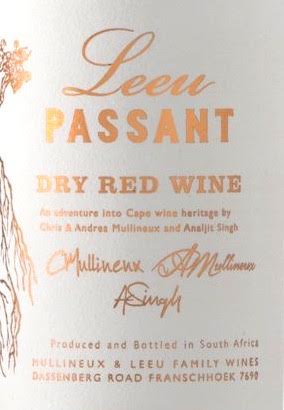Tim James: Place or producer – which should have primacy?
By Christian Eedes, 10 April 2017
In old Europe it’s the names of places that are usually the prime definers of wines: the vineyard or village, or perhaps the domaine. That’s true of old South Africa too, from Constantia and Vergelegen onwards, but not of the new South Africa – or, indeed much of the rest of the “New World”. Newer systems can be seen to argue less of a commitment to the origins of wine in place and more commitment to wine’s origins in human endeavour. Crudely put, it fits into the pattern which the Old World often accusatorily finds in the New: placing winemaker above terroir. And in fact, many of the wines bear the names of people, generally winemakers and/or proprietors, as their primary identifier.
I was prompted into thinking of this question by the labels of the excellent new offerings from Leeu Passant. Each carries the legend “An adventure into Cape wine heritage by Chris & Andrea Mullineux and Analjit Singh”, and underlines the personal stress by including the signatures of all three. I’m sure the hope is that these are the first releases of vintages trailing into future centuries, and I wonder if the idea is that the labels will one day bear the names of future winemakers and owners, or always the names of the three founders? (Analjit Singh is in his early 60s, Chris and Andrea at least a few decades less.)
While Leeu Passant is an invented name, many new local producers have a surname as the main brand – including Mullineux for the other branch of Mullineux and Leeu Family Wines. There are many: Sadie Family Wines, Alheit Vineyards, Paul Cluver Estate, etc, etc. Presumably ego plays a significant role in all this, as well as the proud assertion of the importance of people vis-à-vis place. Marketing too: it’s not going to harm the sales of Leeu Passant in these early years to have “Mullineux” mentioned four times on the label!
Although I said that the Old World usually relies primarily on origin for naming, that’s a truth that needs to be modified. It’s crucial, for example, to know the different producers involved in Hermitage or Clos de Vougeot – but they are generally relegated to secondary importance (at least philosophically, or is it emotionally?). This is shown by the much smaller type with which those family names appear – frequently one has to search for it, if one doesn’t recognise the label by its design.
Interestingly that approach, in contradistinction to most local practice, is followed by Sadie Family Wines. The proprietory name is actually very small on the label – though it’s a brand rather than an origin which makes the biggest claim: Columella rather than Swartland, Kokerboom rather than Olifantsrivier, etc, but all of them bigger than the producer name.
South African estates (by which I mean producers with a solid land-holding base) are split between those which use a family name and those which use a historic or more recently invented name. A couple do both, which seems to me a rather nice practice, one frequently found in Bordeaux (Mouton-Rothschild, Léoville-Barton): Delaire Graff and Solms-Delta are the local equivalents I can immediately think of.
There’s perhaps less choice for those which don’t own land, but buy in grapes. But it’s here that I’m perhaps most puzzled when thinking of the future. When you name a wine-brand after the winemaker, and stress the human element, you are tying it up perhaps even more than is necessary.
The danger of a new brand being attached umbilically to a winemaker is obvious. If Eben Sadie and the Alheits and the Mullineux, for example, were to disappear tomorrow – Bacchus forbid! – the value of their brands would be shredded, especially in the absence of established landholdings. The same would apply to AA Badenhorst Family Wines – but not, I suspect, to the Badenhorst-owned brand Secateurs, as that is much less linked to the talented and charismatic individual who founded it.
Of course, all this is also a declaration of faith in the future. Once a few generations of Sadies and Newton Johnsons have made wine for the “family” label, especially when there are owned vineyards involved, a reputation will become established. Sufficiently so, it must be hoped, for it to even no longer matter much if the family is involved, any more than it does in Bordeaux, many of whose names reflect a frozen moment of ownership history.
- Tim James is founder of Grape.co.za and contributes to various local and international wine publications. He is a taster (and associate editor) for Platter’s. His book Wines of South Africa – Tradition and Revolution appeared in 2013.









Comments
0 comment(s)
Please read our Comments Policy here.